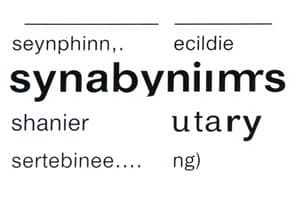Podcast
Questions and Answers
What is the primary purpose of using antonyms and synonyms in language?
What is the primary purpose of using antonyms and synonyms in language?
- To confuse the reader with complex vocabulary
- To enhance vocabulary and express ideas effectively (correct)
- To replace all commonly used words with difficult ones
- To avoid using standard dictionary definitions
Which of the following is NOT a benefit of using a thesaurus?
Which of the following is NOT a benefit of using a thesaurus?
- Identifying antonyms for increased contrast
- Expanding vocabulary
- Finding synonyms for a word
- Understanding the precise meaning of a word (correct)
Which of the following pairs correctly exemplifies an antonym relationship?
Which of the following pairs correctly exemplifies an antonym relationship?
- Happy - Joyful
- Bright - Shiny
- Hot - Cold (correct)
- Fast - Quick
Why is it important to learn common antonyms and synonyms?
Why is it important to learn common antonyms and synonyms?
Which of the following sentences demonstrates the proper use of a synonym?
Which of the following sentences demonstrates the proper use of a synonym?
Which of the following is a synonym for the word 'happy'?
Which of the following is a synonym for the word 'happy'?
What role does a thesaurus play in vocabulary building?
What role does a thesaurus play in vocabulary building?
Which of the following words is an antonym of 'vivid'?
Which of the following words is an antonym of 'vivid'?
Which of the following sentences demonstrates the use of antonyms?
Which of the following sentences demonstrates the use of antonyms?
Which option is commonly considered a benefit of using synonyms?
Which option is commonly considered a benefit of using synonyms?
Flashcards are hidden until you start studying
Study Notes
Antonyms and Synonyms: Definition and Examples
- Antonyms are words with opposite meanings (e.g., hot/cold, dark/light).
- Synonyms are words with similar meanings (e.g., big/large, happy/joyful).
- Understanding antonyms and synonyms enhances language comprehension and expression.
Usage in Sentences
- Utilizing synonyms can prevent repetition and enrich writing (e.g., "happy" can be replaced with "joyful" or "content").
- Employing antonyms helps clarify contrast (e.g., "His attitude was cheerful, but her mood was dreary").
Thesaurus Applications
- A thesaurus is a valuable tool for finding synonyms and antonyms.
- Using a thesaurus helps learners discover alternative words, enhancing vocabulary and stylistic variation.
Importance in Vocabulary Building
- Expanding vocabulary through the use of synonyms and antonyms allows for more precise communication.
- Understanding contrasting words develops critical thinking and improves the ability to analyze meanings and contexts.
Common Antonyms and Synonyms Lists
- Common synonyms:
- Happy: joyful, glad, content
- Sad: unhappy, sorrowful, dejected
- Common antonyms:
- Fast: slow
- Light: heavy
- Familiarizing oneself with these lists fosters rapid vocabulary growth and better language skills.
Studying That Suits You
Use AI to generate personalized quizzes and flashcards to suit your learning preferences.




